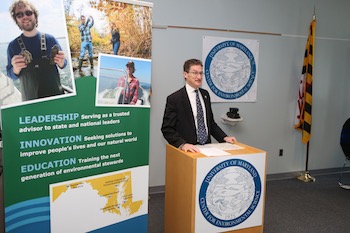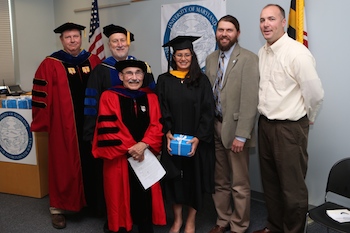SOLOMONS, MD (May 10, 2016)--The University of Maryland Center for Environmental Science’s third annual Commencement ceremony was held on May 10 at the Chesapeake Biological Laboratory and featured Maryland Secretary of the Environment Ben Grumbles as keynote speaker. He told graduates, “Don’t ever get tired for searching for finding innovative, cost effective, surprising solutions that really do save us from ourselves and provide for a brighter future.”


 Thirteen students received joint degrees from the University of Maryland Center for Environmental Science (UMCES) and the University of Maryland College Park (UMD). This year, UMCES received accreditation from the Middle States Commission on Higher Education. The accreditation and earlier approvals by the General Assembly and the University System of Maryland Board of Regents authorize UMCES to award joint graduate degrees with the University of Maryland.
Thirteen students received joint degrees from the University of Maryland Center for Environmental Science (UMCES) and the University of Maryland College Park (UMD). This year, UMCES received accreditation from the Middle States Commission on Higher Education. The accreditation and earlier approvals by the General Assembly and the University System of Maryland Board of Regents authorize UMCES to award joint graduate degrees with the University of Maryland.
Every year, nearly 100 graduate students study and work alongside UMCES scientists and faculty members through the Marine Estuarine Environmental Sciences (MEES) Program, a nationally eminent interdisciplinary graduate program. Students go on to careers in academia, state and federal government, industry and non-governmental organizations.
“There are lots of opportunities in Environmental science, and you will be successful in those ventures,” said Ed Houde, UMCES Vice President for Education.
The commencement ceremony featured Maryland Secretary of the Environment Ben Grumbles delivering the keynote address.
“It makes me shudder to think about what our environment would look like if we weren’t applying science, technology, monitoring, and modeling,” said Secretary Grumbles. “Hats off to all of you in this arena of science based decision making and environmental protection based on science.”
UNIVERSITY OF MARYLAND CENTER FOR ENVIRONMENTAL SCIENCE
For 90 years, the University of Maryland Center for Environmental Science has led the way toward better management of Maryland’s natural resources and the protection and restoration of the Chesapeake Bay. From a network laboratories located across the state that includes Horn Point Laboratory and Chesapeake Biological Laboratory, UMCES scientists provide sound advice to help state and national leaders manage the environment, and prepare future scientists to meet the global challenges of the 21st century. www.umces.edu
# # #

